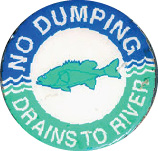Under the Illicit Discharge Elimination Program measure of the Storm Water Management Program (SWMP), the City of Ann Arbor must monitor its storm drain system for non-stormwater discharges and correct them. Illicit discharges to the storm drain system often include pathogens, nutrients, surfactants, and various toxic pollutants that are harmful to aquatic systems.
What is an illicit discharge?
An illicit discharge is any discharge to, or seepage into, a separate storm sewer that is not composed entirely of storm water or uncontaminated groundwater. Such discharges are considered “illicit” because the storm sewer system is not designed to accept, process, or discharge such non-stormwater wastes.
Examples
Improper storm-sanitary sewer connection
A home's sanitary sewer line is mistakenly connected to the storm sewer system, sending domestic household waste, wash water, and other wastewater directly to the Huron River.
Sanitary sewers collect wastewater from indoor plumbing such as toilets, sinks, washing machines, and floor drains and take it to a sewage treatment plant. Storm drains flow directly into local waterways and do not receive treatment for pollutant removal. Physical connections between sanitary and storm sewers result in the discharge of raw sewage, chemicals, and other pollutants into surface waters.
Intentional dumping
Each night, the busboy at a local restaurant dumps his bucket of dirty mop water on the pavement behind the building, where it flows into a stormwater catch basin, and eventually into a small stream.
The dirty mop bucket contains detergents, food waste, and other pollutants that degrade aquatic habitat and harm stream organisms. Such waste should be directed to the sanitary sewer system so it can be treated.
Accidental spill
A diesel storage tank at a gas station leaks and overflows into the storm drain system.
Automotive chemicals such as diesel fuel are highly toxic to aquatic wildlife and humans. A small amount of these chemicals can contaminate thousands of gallons of water. Such materials should be recycled or disposed of properly.
What are Ann Arbor's regulations regarding illicit discharges?
Chapter 33 of Ann Arbor City Code (2:215 - Use of the stormwater system) prohibits unauthorized discharges into the city's stormwater system.
How does the city monitor for illicit discharges?
The City of Ann Arbor routinely inspects the sanitary and stormwater systems by closed circuit television and during system cleaning activities. If an illicit discharge is identified, city staff may use dye testing to determine the source of the pollutants. Once an illicit discharge is confirmed, staff work with all involved parties to correct the problem.
For illicit discharges that result from intentional dumping and accidental spills, public education programs are extremely important. The Washtenaw County Water Resources Commissioner's program "Community Partners for Clean Streams" educates commercial property owners in the county about pollution prevention, illicit connections, and illicit discharges. In addition, public
education efforts by the city often focus on pollution prevention.
What can I do to prevent illicit discharges? 
There are many things you can do to prevent illicit discharges and protect water quality. Check our Resident's Guide to Clean Water (PDF) for more information.
Never dump anything in a storm drain or into a drainage ditch.
Clean up after your pet. Pet waste is a significant source of pathogens to the Huron River.
Throw litter in its proper place. If you see garbage near a storm drain, pick it up.
Properly dispose of household hazardous wastes at designated locations. Never pour them into storm drains, down the sink, or on the ground. In Washtenaw County, contact the Home Toxics Reduction Program to dispose of these materials.
Regularly check your vehicles for leaks (and repair them).
Compost yard wastes
Recycle motor oil and other automotive fluids. These items may be taken to the Drop-Off Station.
Use fertilizers and pesticides only when needed, and always follow the label instructions.
Wash vehicles in the yard, not on pavement. Better yet, take your car to a carwash, where all wastewater flows into the sanitary sewer system for treatment.
Report illegal dumping immediately.
MDEQ Pollution Emergency Alert System: 800.292.4706
